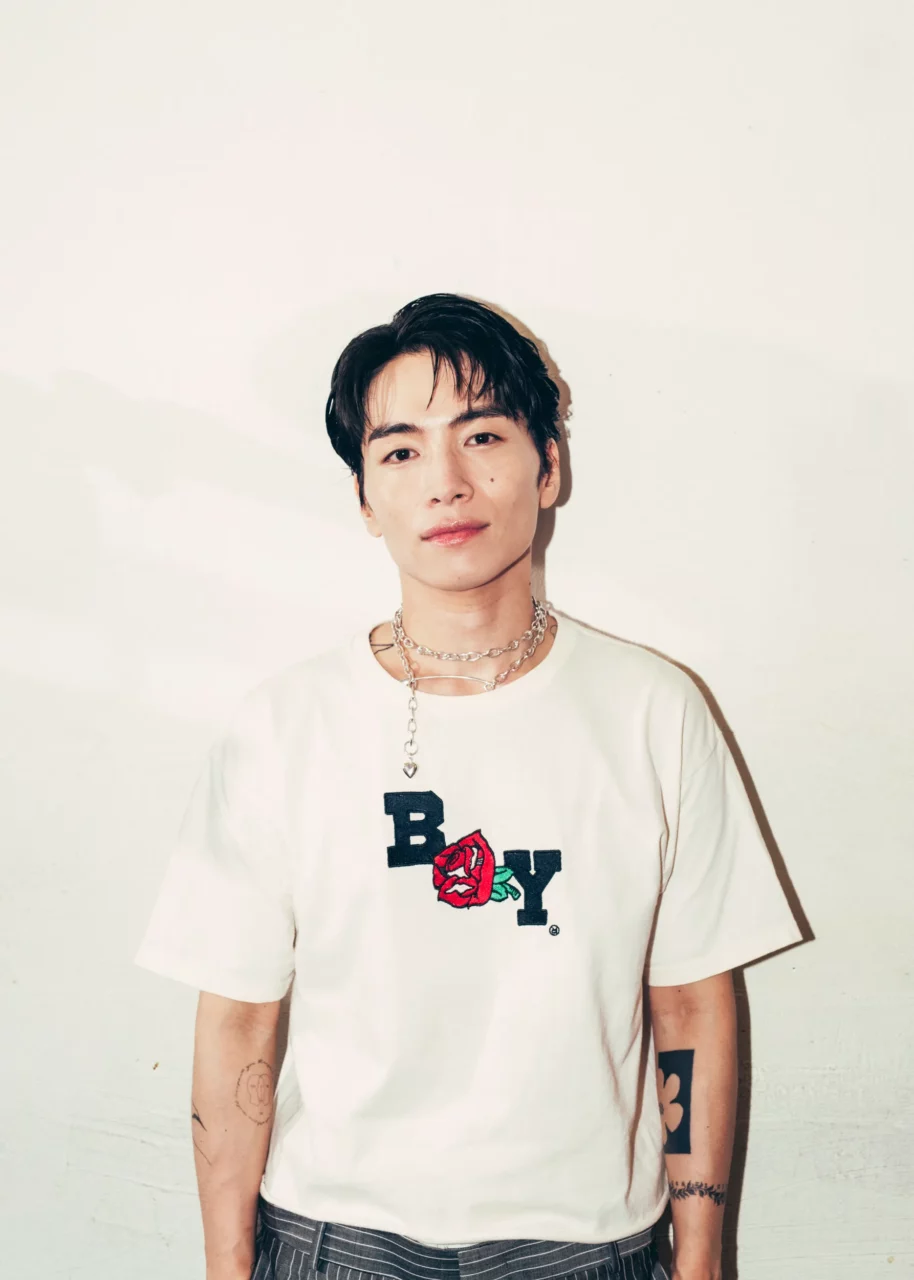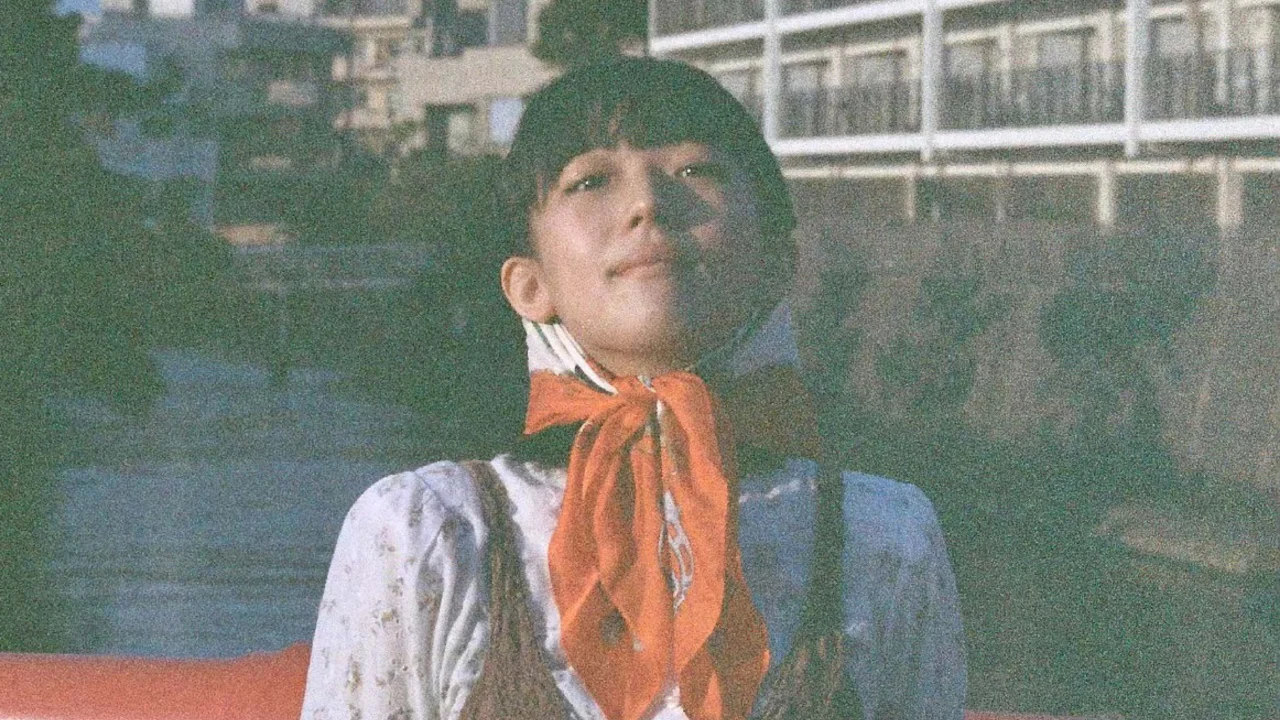Ayumu Imazu, who made waves worldwide with his hit “Obsessed,” and SIRUP, an artist Imazu has long respected. We explored these big topics like “buzz” and “global success” from a personal angle, discussed SIRUP’s excitement about his role in the Grooving Night event, and examined the ways both artists engage with social issues.
INDEX
From Osaka: A Common Ground for Deep Discussions
-How did you two meet?
SIRUP: We were originally connected on Instagram, and when I traveled to the U.S. in 2022, there was a plan to visit New York and see Ayumu while I was there. We exchanged messages about it, saying we’d get in touch if it happened, but in the end, our schedules didn’t align. Later, we had a proper conversation in Shibuya.
One-on-one?
SIRUP: Yes, one-on-one. Since we both come from Osaka, we talked about our hometown. We also had drinks together a couple more times afterward.

With a vocal style that effortlessly blends rapping and singing, SIRUP creates a refined sound that merges his roots in neo-soul and R&B with gospel and hip-hop. His genre-defying music is crafted to make everyone feel good.
Ayumu, you also posted a cover video of SIRUP’s “Do Well” in 2019, right?
Ayumu: I’ve always been a fan of SIRUP’s music and did a cover of his song, so I was thrilled when he said, “It was fantastic” after seeing the video.
SIRUP: I watched all of it.
What was your impression when you first spoke with each other?
SIRUP: Before we met, I had a strong image of him as “someone living in New York,” but when we actually met, he felt more like “a kid from Osaka” than I expected. I was impressed by how he controls his own career and has a clear vision of why he does what he does.
Ayumu: I found it easy to talk with him from the start. Our values are similar, and it was refreshing to have such deep conversations on our first meeting.
Did you feel that your “way of life” as artists was similar?
Ayumu: Yes, and also in our perspectives on music from both America and Japan.
Do you remember the most interesting conversation you had?
Ayumu: When I studied abroad in the U.S., I felt the challenges of singing but saw great potential in dance. At that time, I talked about wanting to focus on dance in America. My thoughts have changed a bit since then, but that was my focus back then.
SIRUP: Despite his ability to play instruments, sing, create music, and manage projects, he talked about wanting to focus on dance, which I found intriguing.
How has that perspective changed now?
Ayumu:In 2020 and 2021, I wanted to focus on dance and thought about working on production. However, recently, I’ve found myself returning to dance again.

Born May 12, 2000, in Osaka, Japan. Based in both Japan and the U.S., Ayumu Imazu is a global artist representing Generation Z, known for his exceptional dance performances, bilingual singing in Japanese and English, and his work in songwriting, composing, and choreography. His music, characterized by delicate yet direct wordplay and a dramatic worldview, is making waves not only in Japan but across the globe. His recent release, “Obsessed,” topped the Korean Billboard Japan Songs chart in January. The track has become a viral hit across Asia, dominating charts and creating a dance trend on TikTok, thanks to choreographer Taiga, known for his viral dance moves.
INDEX
The Impact of Viral Success on Social Media
There’s been a growing belief among younger generations that the buzz and popularity on social media are more important than the music itself, and music labels are increasingly focused on how to create that buzz. I think we’re at a turning point right now. What happens to those efforts if platforms like TikTok and Instagram disappear? The nature of the internet is changing, and it’s challenging to stay ahead of it. Has the global success of “Obsessed” changed anything for you?
Ayumu: It wasn’t until I saw how a single TikTok video could drive such impressive numbers that I fully understood why focusing on social media is important. When I couldn’t see the numbers despite my efforts, social media sometimes felt a bit ridiculous. But with “Obsessed,” I’ve found it easier to engage with social media and create content more comfortably.
One of the questions you had previously sent to SIRUP was about how he views the recent trend of simple-sounding songs becoming popular. Since “Obsessed” also has a simple sound, has the success of “Obsessed” changed your approach to making music?
Ayumu: I like the song itself, but I thought it was something I would never release as a single. So, I’m grateful that TikTok exists in this era. At the time, I released it with the attitude of “Let’s see how it performs and if it gets good reactions, we’ll release it.”
SIRUP’s “LOOP” also went viral, but wasn’t it originally considered for rejection?
SIRUP: Exactly. Ayumu’s previous songs had a lot of gimmicks, but “Obsessed” was different. It seems like minimalistic songs go viral on social media because they’re easier for listeners to react to.
Ayumu: TikTok and Instagram Reels are more about hearing a snippet of about ten seconds rather than listening to the full track. So, it makes sense that minimalistic and straightforward songs might perform better.
SIRUP: “Obsessed” had a more approachable side compared to the “super cool Ayumu Imazu” of the past, with a sense of familiarity and reality in its lyrics. I think that’s why fans were so pleased with it.
INDEX
Harnessing Events for Social Commentary
The upcoming event where the two of them will perform together, Grooving Night, has the theme of “Connecting Music, Society, and People with a New Music Event.” It features a two-part format with live music and a talk section where guests discuss social issues. After three previous events, what are SIRUP’s thoughts on hosting this initiative?
SIRUP: The reason we started this was because I felt that when making social statements outside of music, it’s difficult to convey the message effectively through just SNS. With Grooving Night, we have live performances, so we can connect society, music, and live shows in a way that doesn’t feel heavy, and convey messages in an ideal form. Additionally, I hope that through the talks, guests will get a deeper understanding of the artists’ thoughts and take away a richer experience from the music they’ve been listening to.
In Japan, artists sometimes face criticism when they simply say “go vote,” with people saying things like, “I liked their music, but it’s disappointing to tie it with politics,” or when discussing social issues during live MCs, some argue that live performances should be an escape from reality and not involve real-world discussions. By declaring an event dedicated to discussing social issues, it seems like you’re opening up more opportunities to address these topics.
SIRUP: We started this event at a time when there was a growing interest among listeners in social issues, and I hope it will continue to grow into a bigger movement.
What are some of the interesting or memorable stories from previous Grooving Night events?
SIRUP: At the second event, Show Okamoto from OKAMOTO’S gave a fascinating talk about the value of marriage. It was quite rare in Japan for someone who is married to openly discuss the imposition of marriage views. For example, he addressed the common expectations like “Your wife must be waiting at home” or “Eventually, you’ll start a family,” and talked about how these societal pressures on married people are actually just personal choices. The fact that he, being married himself, was able to discuss this openly in front of a large audience was significant.


INDEX
Promoting Audiovisual Accessibility and Advancing Minority Rights through Event Initiatives
**In addition to the talks, the event addresses social issues through initiatives that ensure “no one is left behind.” This includes offering audiovisual support for people with visual and hearing impairments (1) and featuring a booth from the NPO “Nijiiro Diversity,” which works to protect the dignity and rights of sexual minorities, their families, and allies (2). What was the specific intention behind inviting Ayumu to such an event?
*1 Note: At ‘Grooving Night #3,’ held in March 2024, glasses with integrated subtitles and visuals were introduced for those with hearing impairments, and tablets were provided for individuals with low vision to view stage content up close.*
2 Note: SIRUP has long advocated for the acceptance of sexual minorities in Japanese society. At the previous event, a booth from the accredited NPO “Nijiiro Diversity,” which operates the permanent LGBTQ center ‘Pride Center Osaka,’ was featured.
SIRUP: While being an outstanding artist, Ayumu is also one of the few who genuinely engages with the context of Black music, which is often overlooked. When we first met, we had an honest conversation about racial discrimination. For ‘Grooving Night,’ I wanted to invite someone who could engage in such discussions, which is why I extended the invitation to him.
What are Ayumu’s thoughts on participating in the event?
Ayumu: I’m excited just to be able to perform alongside SIRUP. Additionally, I think it’s wonderful that this event creates a space to discuss social issues within the context of a live performance. Although I’m not typically outspoken about social issues, I have a lot of thoughts on the subject, and I hope to share at least a little of that.
As a writer, I’ve noticed a trend where online content and written material are often seen as representing a person’s entire identity. I don’t believe it’s essential to comment on social issues online, and given that Japanese people are often thought to have difficulties with discussions, this event is designed to encourage collaborative thinking rather than delivering lectures.
Ayumu: I appreciate that. Creating an environment where we can discuss things rather than impose my own thoughts is important, so I think this event is great.
What specific topics would you like to discuss with SIRUP?
Ayumu: I’ve been dancing since I was six, but I feel that dancers in Japan are not protected. In the U.S., there are dancers’ unions, minimum wage standards, and an environment where one can speak out. However, in Japan, people often accept any conditions and say, “I’ll do whatever you ask,” which makes it difficult to speak out about issues. I’d like to see improvements in this area.
SIRUP: There are also challenges related to choreography.

Ayumu: Yes, choreography does not receive copyright protection. So, once a choreographer gives their approval, it can end up being danced by many people on platforms like TikTok, and it becomes detached from its creator. I want to work on improving this situation.
SIRUP: I wonder how far the South Korean government has progressed with their guidelines on choreography copyright.
—n my book The A to Z of the World and Me (Kodansha, 2022), I wrote about issues like a dance created by a regular Black person on TikTok being covered by a prominent influencer like Charli D’Amelio, resulting in it being associated with Charli’s choreography.
Ayumu: Recently, it seems that in Korea, crediting the origins of choreography has become more important.
SIRUP: We haven’t discussed crediting or musical topics in the past three events, so I think it’s important to cover these issues this time.
As artists become more mainstream, there’s a tendency for them to avoid discussing personal or industry issues. This results in listeners consuming artists and their work as neatly packaged content, with a growing expectation that idols, for instance, should not express their struggles. However, there are also artists like Billie Eilish and Olivia Rodrigo who share their real experiences. Although the audience at events may be limited, I believe that conveying authentic struggles and industry issues can contribute to the overall sustainability of the industry.
SIRUP: That’s absolutely true.
Ayumu: I feel that simply keeping quiet about issues, including in dance, won’t lead to improvements.

INDEX
“Pursuing Your Passions Defines Your Individuality” (Ayumu)
I think that SIRUP expanding his activities overseas reflects a kind of “romanticism toward life” where he wants to have diverse experiences through music. Ayumu-kun is living in the U.S. and has many young American listeners, which feels like a different style of activity compared to SIRUP. What was the motivation behind deciding to pursue activities abroad?
Ayumu: The entire reason is that I was able to study abroad in New York when I was 14. Being in New York at a time when I was most receptive to learning allowed me to not only develop my skills as an artist but also to think about the kind of person I wanted to be. It helped me gain a more objective view of how I was perceived.
At 14, it’s a period when people discover various aspects of their identity, even if they are living in Japan. It’s different from going abroad as an adult and experiencing cultural differences. What did you feel during that time?
Ayumu:It was significant for me to gain an objective view of how Japanese people are perceived. Living in America for the first time made me experience what it’s like to live as a foreigner.

Especially in New York, it seems like doing something different from others is the shortcut to success, right? By viewing myself objectively, I think I was able to understand what I could do to stand out.
Ayumu: Everyone has such unique personalities that even if you don’t intentionally try to do something different, I feel like if you just pursue what you really want to do, that in itself becomes your individuality.
SIRUP: What I thought while listening to you is that when I was 14, I was only thinking about my middle school friends, but since you were doing dance, which is a universal language, you were probably able to see things from a global perspective.
-SIRUP, what differences or gaps do you feel between your activities in Japan and overseas?
SIRUP:As an adult, I started performing overseas, and in a light sense, I’ve noticed differences in the points where Japanese and overseas audiences react to live performances and music. I’d like to hear Ayumu’s thoughts on this too.
Ayumu:The biggest thing I notice when interacting with American artists is that in Japan, people tend to work as a team, but in America, it feels like there’s a strong sense of responsibility with the artist at the center and the staff supporting them. It’s different from Japan.
Do you mean there are more things the artist has to decide on their own?
Ayumu:Yes, that’s part of it, but the approach is fundamentally different. MAX, who featured on my track, is an incredible person who manages his entire team on his own. Of course, there are people like that in Japan too, but in America, that method seems to be the norm, and I felt that gap.
In Japan, the people around the artist often take care of things to avoid burdening them, but as a result, the artist’s sense of initiative can sometimes diminish.
SIRUP: I imagined that in America, everyone has so much initiative that it’s hard to get things organized, but it turned out to be completely different.



























